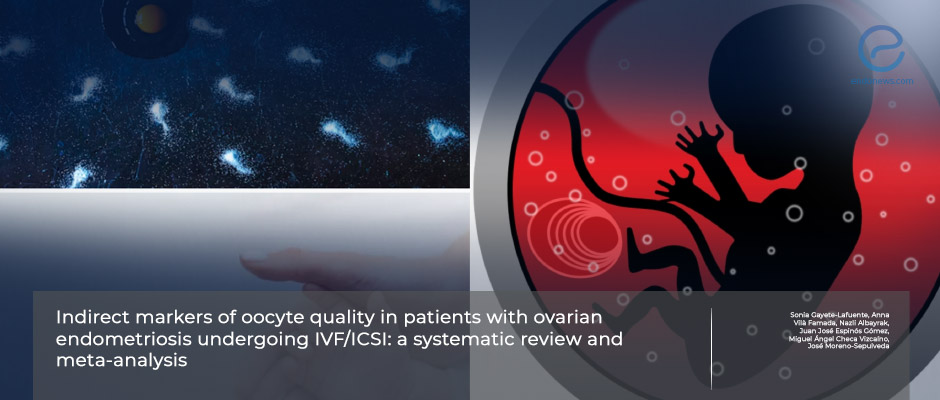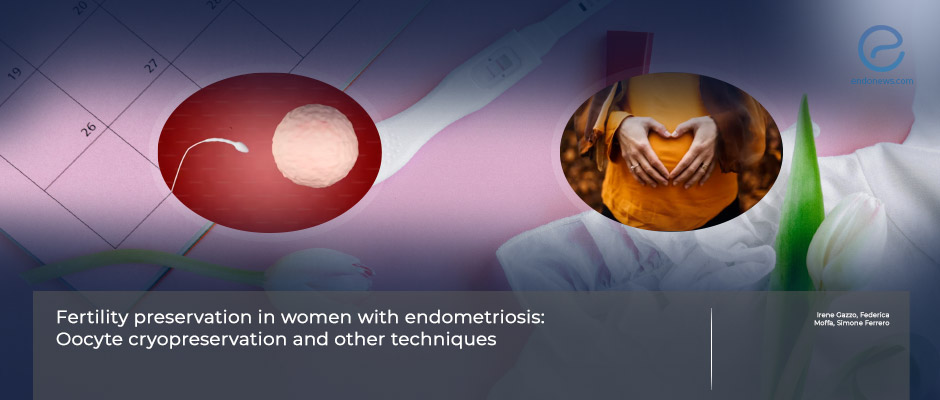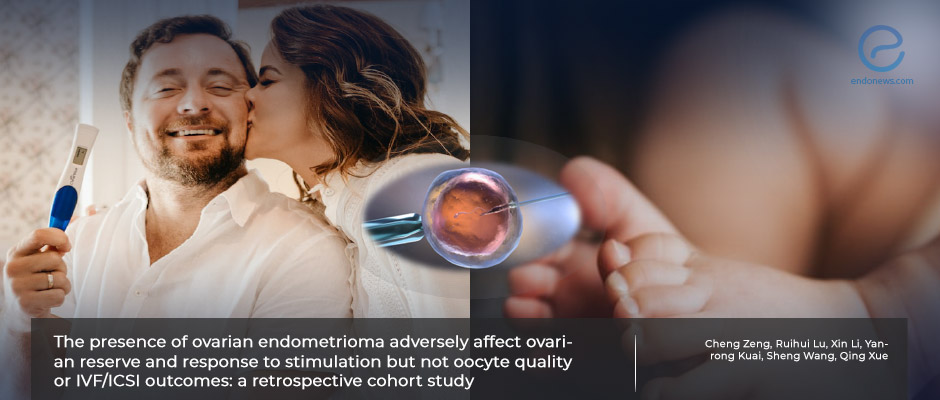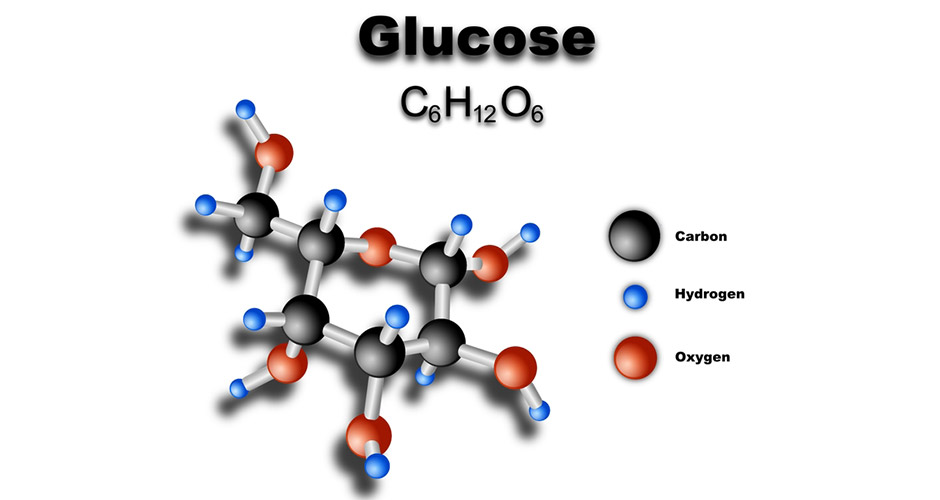Ovarian Endometrioma Does Not Affect Egg Quality, Study Suggests
Ovarian endometrioma could decrease oocyte yield in patients undergoing in vitro fertilization (IVF) or intracytoplasmic sperm injection (ICSI), according to a new literature review and meta-analysis published in the scientific journal Reproductive BioMedicine Online. However, it does not seem to…
Key Points Lay SummaryThe need for fertility preservation in women with endometriosis
A variety of pathologies such as adhesions, inflammation, modified pelvic anatomy, and altered ovarian reserve are among the causes of infertility in women with endometriosis. Additionally, these patients experience suboptimal outcomes characterized by reduced pregnancy rates when they undergo assisted…
Key Points Lay SummaryWhat Happens to all Those Frozen Eggs?
The rate of return to use previously vitrified oocytes is notably low even though there is an increase in the number of patients pursuing oocyte cryopreservation, found a new study published in JAMA Network Open. According to the authors of…
Key Points Lay SummaryEmbryo Morphokinetics of Endometriotic Patients by Time Lapse Monitoring
Many studies showed adverse effects of endometriosis on oocyte quality due to increased apoptosis and dysregulation of molecular pathways related to the development and growth of granulosa cells resulting on developmental arrest in embryos of women with endometriosis. Time-lapse monitoring…
Key Points Lay SummaryModerate-to-severe Endometriosis and "The Cumulative live birth rate" in IVF Cycles
Infertility is one of the major symptoms in women with endometriosis. The incidence of endometriosis is approximately 10% in reproductive-aged women and up to 40-50% in infertile women. There are multifactorial mechanisms resulting in endometriosis-associated infertility such as anatomic distortion, impaired…
Key Points Lay SummaryDoes ovarian endometrioma affect embryo aneuploidy rate in fertile women?
One of the most common clinical findings of women with endometriosis is the decline in fertility status. These women often benefit from in vitro fertilization methods to become pregnant. However, whether there is a detrimental effect of endometriosis on oocyte and…
Key Points Lay SummaryThe optimal endometrial preparation protocol in FET cycles of women with endometriosis.
Endometriosis can create infertility and may require treatment with assisted reproductive technology (ART) to induce pregnancy. However, the current literature rarely discusses the optimal endometrial preparation protocol in thawed-frozen embryo transfer (FET) cycles for endometriotic patients. Dr.Jin. group from the Reproductive…
Key Points Lay SummaryOvarian endometriomas, ovarian reserve, oocyte quality and IVF/ICSI outcomes
Surgery and assisted reproductive technology (ART) are the preferred treatments for endometrioma in infertile patients. When ART is considered, surgery may seem to have no advantages, as it may not improve pregnancy outcomes and may carry the risk of decreasing…
Key Points Lay SummaryDoes endometrioma size have an effect on IVF/ICSI outcomes?
Assisted reproductive technologies including IVF/ICSI can be suggested as the therapeutic option in women with endometriosis-associated infertility. In literature, there is a controversy regarding the influence of endometrioma size on IVF/ICSI outcomes. The group led by Drs Chapron and Santoulli…
Key Points Lay SummaryThe Oocyte Quality in Ovarian Endometriosis
Endometrioma is the ovarian involvement of endometriosis affecting up to 44% of women diagnosed with the disease. Owing to the anatomical locus, ovarian endometriosis may impair folliculogenesis and oocyte competence, differing from other forms of endometriosis. When investigating the relationship between…
Key Points Lay SummaryAre my Eggs Good Enough for IVF?
There does not seem to be any difference in the rate of live births between women with endometriosis who became pregnant following IVF using their own eggs or eggs obtained from a donor. This suggests that oocyte quality may not…
Key Points Lay SummaryOptimal management of infertility in endometriosis patients
Pelvic pain and infertility are the main symptoms of endometriosis patients. Although the pathophysiological mechanism for infertility is not clearly understood, there are several theories explaining decreased fertility potential in women with endometriosis. Ata and Telek, from Koc and Istanbul Universities…
Key Points Lay SummaryFertilization rate and pregnancy outcome in IVF cycles of endometriosis.
Endometriosis affects the pelvic cavity, uterus, ovaries and causes impaired fertility as a result. The chronic inflammatory nature of this disease negatively impacts the oocyte quality, maturation, and fertilization. Obviously, fewer oocytes can be harvested in the IVF cycles of…
Key Points Lay SummaryLive Birth Rate in Women Who Underwent Fresh Embryo Transfer Using Freshly Retrieved Donor Oocytes
One of the important clinical findings in women with endometriosis is reproductive problems. Infertility can be encountered in up to 50% of women with endometriosis and up to 50% of women with infertility can be diagnosed with endometriosis. Several pathophysiologic…
Key Points Lay SummaryIs oocyte cryopreservation useful for fertility preservation in ovarian endometriosis?
Women with endometriosis tend to have lower fecundity compared to normal couples. Furthermore, endometrioma itself may reduce the ovarian reserve by altering ovarian physiology in the surrounding healthy ovarian tissue. The treatment for endometrioma is surgical removal in most cases, however,…
Key Points Lay SummaryFertility conservation in women with endometriosis
Endometriosis affects 10-15% of women in their reproductive period and almost half of them may need Assisted Reproductive techniques to conceive. Moreover, increased malignancy risk is threatening the women with severe endometriosis in addition to their decreased ovarian reserve. Due…
Key Points Lay SummaryFertility preservation protocols in women with endometriosis
Infertility is one of the major symptoms in women with endometriosis. Childbearing at a delayed age is preferred by the majority of women recently who consult for the demand for fertility preservation procedures. There are several techniques for fertility preservation…
Key Points Lay SummaryEndometriosis and ovarian reserve
Endometriosis is most frequently encountered in reproductive-aged women. Its prevalence is 10-15% in the general population of this age. However, endometriosis is diagnosed more frequently in infertile women with a prevalence of 25-40%. Although the exact mechanism explaining the association between…
Key Points Lay SummaryDoes ovarian endometriosis affect oocyte quality?
Endometriosis is a very common gynecological disorder affecting women in their reproductive years. It is reported that patients with endometriosis have reduced implantation and pregnancy rates compared to healthy women. According to the various previous studies, the quality of the…
Key Points Lay SummaryShedding light on the fertility preservation debate in women with endometriosis: a swot analysis.
There is little known about fertility preservation in women with endometriosis. Researchers from France and Switzerland conducted a SWOT (strengths, weaknesses, opportunities, and threats) analysis to better understand this topic. Applied to clinical problems, SWOT gives a thorough analysis of…
Key Points Lay SummaryVitamin C supplementation in the patients with endometriosis undergoing in vitro fertilization-embryo transfer
Endometriosis is defined as the localization of endometrial stromal and glandular cells outside the uterine cavity. Women having endometriosis present with dysmenorrhea, dyspareunia, chronic pelvic pain, and infertility. Thus, infertility remains a significant problem for women with endometriosis. Endometriosis is…
Key Points Lay SummaryEndometriosis can Adversely Affect Oocyte Quality
Kasapoglu et al. recently published a study in Gynecological Endocrinology titled “Detrimental effects of endometriosis on oocyte morphology in intracytoplasmic sperm injection cycles: a retrospective cohort study.” In this paper, they compared the oocytes recovered from women who have endometriosis…
Key Points Lay SummaryEFA Medical Conference 2017: "Fertility Preservation to BRCA Mutations" Presentation by Dr. Kutluk Oktay
Dr. Kutluk Oktay is the Director of the Laboratory of Molecular Reproduction & Fertility Preservation as well as a Professor of OBGYN at Yale University School of Medicine. Dr. Oktay also presented at the EFA 2017 Medical Conference, and his…
Key Points Lay SummaryEndometrial Receptivity and Infertility
A study entitled “Endometrial receptivity in eutopic endometrium in patients with endometriosis: it is not affected, and let me show you why” was recently published in Fertility and Sterility explored the relationship between endometriosis and infertility. This study conducted by Miravet-Valenciano et al.…
Key Points Lay SummaryICSI Outcomes for Laparoscopic Intervention of Endometriosis
Women with endometriosis can have trouble conceiving and often turn to fertility treatments for help. Guler et al. recently published a paper in Systems Biology in Reproductive Medicine titled “The Impact of laparoscopic surgery of peritoneal endometriosis and endometrioma on…
Key Points Lay SummaryRetinoic Acid Signaling Involved in Endometrial Decidualization
Decidualization occurs in the eutopic endometrium during the luteal phase and is controlled by signaling pathways such as cyclic adenosine monophosphate (cAMP) and progesterone. Researchers from the Northwestern University School of Medicine reported in their recent paper entitled "Altered Retinoid…
Key Points Lay SummaryMetabolomic profiling and biochemical evaluation of the follicular fluid of endometriosis patients.
Metabolites are the intermediates and products of metabolism from our body. Increasingly the study of metabolite content in biological systems can be used to derive useful information to identify disease-related markers, such as the use of glucose in the blood…
Key Points Lay Summary
 By Özge Özkaya
By Özge Özkaya

 By Selma Oransay
By Selma Oransay



 By Hale Goksever Celik
By Hale Goksever Celik










 By Irem Onur
By Irem Onur




 By Dr. Youngran Park
By Dr. Youngran Park

 By Deniz Kocas
By Deniz Kocas


 By Kasthuri Nair
By Kasthuri Nair




 By Murat Osman
By Murat Osman

 By Yu Yu
By Yu Yu